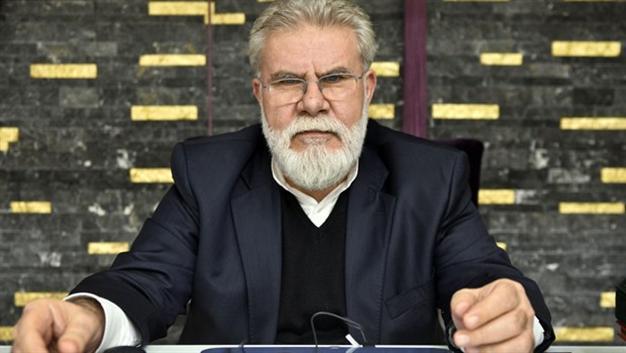Timeline: Clash of Islamist groups is basis for Dec 14 operation
ISTANBUL

Mehmet Nuri Turan, the owner of Tahşiye Publishing House, was arrested for 17 months on suspicion of being the second leader of an allegedly 'Al-Qaeda-linked terrorist organization.' A complaint filed by Turan after his release triggered the Dec. 14 crackdown on members of the Gülen movement.
Turkish law enforcement officials are basing the Dec. 14 crackdown throughout Turkey on a former police operation allegedly carried out by members of the Gülen movement against a rival Islamist movement.
Since the rift between the Turkish government and its ally-turned-nemesis Fethullah Gülen, a U.S.-based Islamic scholar, pro-government media had been accusing the Gülen movement of "abusing" Islam. Similarly, pro-Gülen media has been slamming the government for acting “un-Islamically,” a term that the movement has also used against rival communities.
Security sources speaking to daily Hürriyet explained the chronology of the case that is the focal point of the current crackdown, which has seen the arrests of dozens of people so far, including police chiefs and media figures:
April 6, 2009: U.S.-based Islamic cleric Fethullah Gülen complained about an Islamic group called “Tahşiyeciler” (literally, the Annotators) during a speech. This group, largely unknown to the public before Gülen’s statement, was annotating the Risale-i Nur, an Islamic book written by Said Nursi from the 1910s to the 1950s. The book is a primary religious source for followers of Gülen, who unlike the competing Islamist group, are fiercely against annotating, hence "reinterpreting" it. Although both groups are communities under the broader "Nur" (Light) movement in Turkey, the Annotators are critical of Gülen’s positive stance toward inter-religious dialogue.
April 9-15, 2009: A drama series called “Tek Türkiye” on the Samanyolu TV station portrayed the Tahşiyeciler as a terrorist conspiracy group, while daily Zaman, another pro-Gülen media outlet, featured two critical opinion pieces about the Annotators. Meanwhile, an anonymous informant letter was sent to the Istanbul police regarding the allegedly criminal activities of the group and its leader Mehmet Doğan, a retired imam like Gülen himself.
April 29, 2009: The intelligence unit of the Istanbul Police Department asked the anti-terrorism unit to open an investigation into the activities of the Annotators, who had been organized around a publishing house of the same name (Tahşiye) since 2004.
May 4, 2009: An investigation was opened into the group mentioned in the official documents as “Molla Muhammedi – The Annotators.” Doğan’s pseudonym was Molla Muhammedi.
May 5-6, 2009: Police began wiretapping the phones of the group’s members and changed the group’s name in official documents the next day to the “group of pro-Al-Qaeda radical Mehmet Doğan.”
Jan. 22, 2010: Provincial police organizations in Ankara, Erzurum, Kayseri, Kırıkkale, Muş, Niğde and Samsun arrested 57 people in coordinated raids. Three hand grenades, one smoke bomb, seven pistols, a sword and a dagger were found at the addresses, according to police officials at the time. Doğan would later serve 17 months in jail without conviction.
June 2011: Immediately after their release in the fifth trial session, the group’s leader Doğan and Mehmet Nuri Turan, another leading figure of the Annotators, filed criminal complaints against the Gülenists regarding their imprisonment. They claimed Gülen-affiliated police officials conspired against their group due to their religious views.
May 2014: Doğan and Turan’s initial complaints in 2011 did not produce any results. However, after the Turkish government’s rift with the Gülen Movement turned into an open war early in 2014, Turan repeated his complaint in May. This time, the complaint led to an investigation into the allegedly Gülenist conspiracy in the Annotators case.
Since December 2014: Current Turkish law enforcement officials say they have uncovered a plot against the Annotators, who were wrongly jailed. According to the officials, the bombs that were allegedly found in the houses of the Annotators carried not their fingerprints, but rather the fingerprints of the police officials. In addition, the serial number of the smoke bomb found at the house of an Annotator was the same as another smoke bomb previously seized during the Ergenekon investigation, (another controversial judicial procedure featuring allegations of massive forensic forgery against the foes of the Gülenists).
Dec. 14, 2014: Police detained 31 people allegedly linked to the plot against the Annotators. Along with police officials, daily Zaman's editor-in-chief Ekrem Dumanlı, Samanyolu TV station editor Hidayet Karaca, Zaman columnists and creators of Samanyolu dramas, were taken into custody. While the police suspects are accused of “forging evidence,” the detainees from the media sector are charged with “black propaganda” and slander against the Annotators.
Dec. 15, 2014: A lawyer of the suspects says the police investigation into the Annotators had already began before Gülen publicly spoke about the group in 2009. Three police officers who were detained after their fingerprints were found on the bombs, on the other hand, have denied that there was a plot by claiming “their forensic gloves were old and worn-out.”
Pro-Gülen media outlets claim the crackdown is the government’s answer to suppress the massive corruption probes initiated in December 2013. The pro-government media, on the other hand, alleges that the corruption probes were a “coup attempt” organized by Gülenist police and judiciary officials.
As such, the upcoming legal battle is likely to have ramifications not only for the ongoing political struggle between the government and the Gülenists, but also to the latter group’s ideological struggle with its religious competitors.
